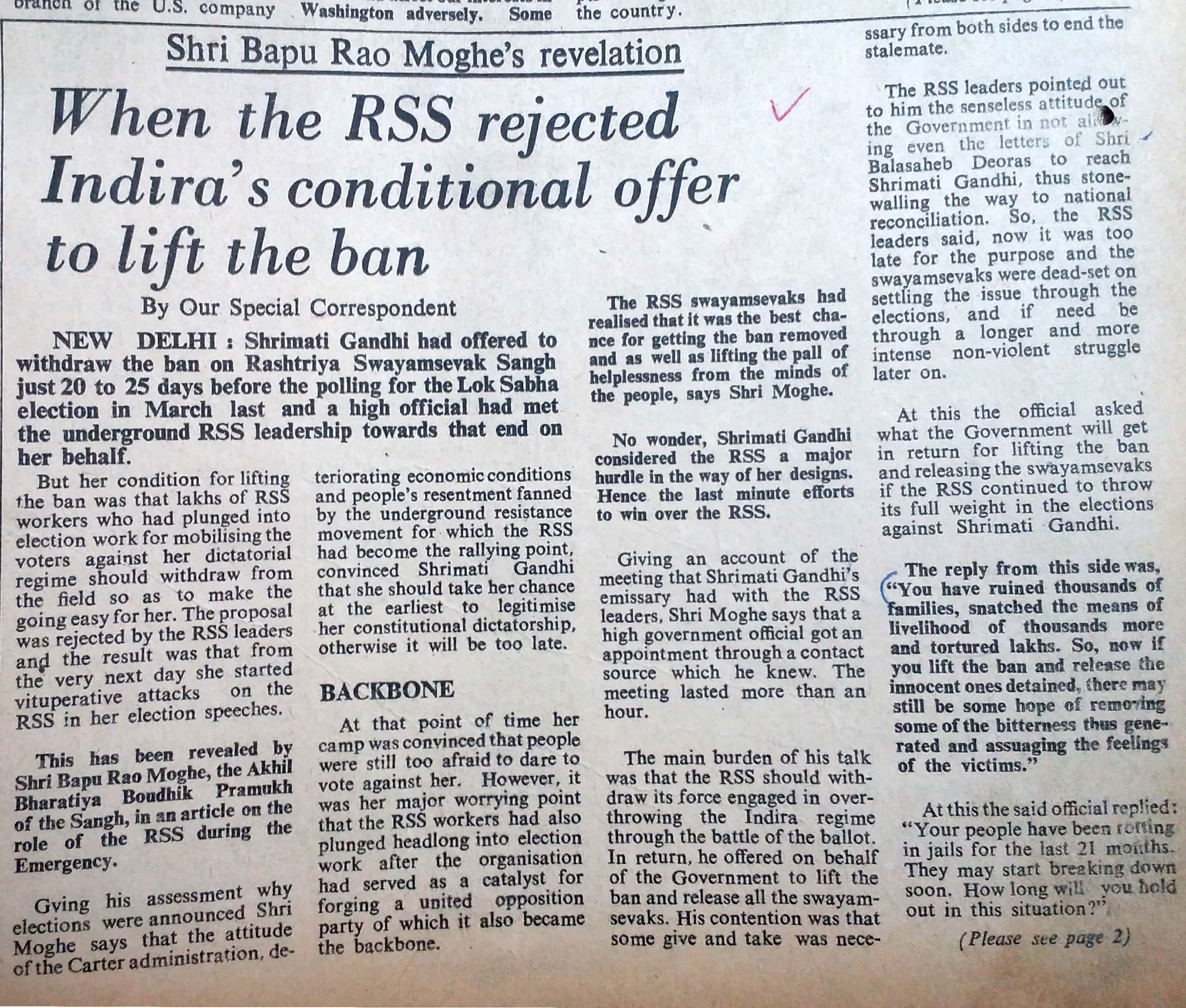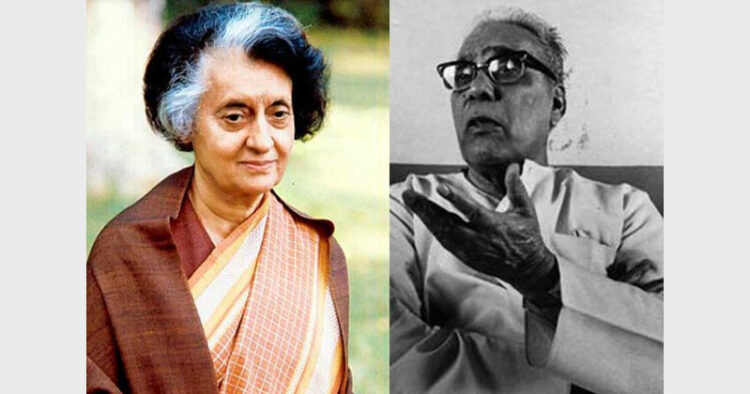
Organiser Archives (August 8, 1977): Smt Indira Gandhi had offered to withdraw the ban on Rashtriya Swayamsevak Sangh (RSS) Just 20 to 25 days before the polling for the Lok Sabha election in March last and a high official had met the underground RSS leadership towards that end on her behalf.
But her condition for lifting the ban was that lakhs of RSS workers who had plunged into election work for mobilising the voters against her dictatorial regime should withdraw from the field so as to make the going easy for her. The proposal was rejected by the RSS leaders and the result was that from the very next day they started vituperative attacks on the RSS in her election speeches.
This has been revealed by Shri Bapu Rao Moghe, the Akhil Bharatiya Boudhik Pramukh of the Sangh, in an article on the role of the RSS during the Emergency.
Giving his assessment why elections were announced Shri Moghe says that the attitude of the Carter administration, deteriorating economic conditions and people’s resentment fanned by the underground resistance movement for which the RSS had become the rallying point convinced Shrimati Gandhi that she should take her chance at the earliest to legitimize her constitutional dictatorship. Otherwise it will be too late.

At that point of time her camp was convinced that people were still too afraid to dare to vote against her. However, it was her major worrying point that the RSS workers had also plunged headlong into election work after the organization had served as a catalyst for forging a united opposition party of which it also became the backbone.
The RSS swayamsevaks had realised that it was the best chance for getting the ban removed and as well as lifting the pall of helplessness from the minds of the people, says Shri Moghe.
No wonder, Smt Gandhi considered the RSS a major hurdle in the way of her designs. Hence the last minute efforts to will over the RSS.
Giving an account of the meeting that Smt Gandhi’s emissary had with the RSS leaders, Shri Moghe says that high government official got an appointment through a contact source which he knew. The meeting lasted more than an hour.
The main burden of his talk was that the RSS should withdraw its force engaged in overthrowing the Indira regime through the battle of the ballot. In return, he offered on behalf of the Government to lift the ban and release all the swayamsevaks. His contention was that some give and take was necessary from both sides to end the stalemate.
The RSS leaders pointed out to him the senseless attitude of the Government in not allowing even the letters of Shri Balasaheb Deoras to reach Smt Gandhi, thus, stonewalling the way to national reconciliation. So, the RSS leaders said, now it was too late for the purpose and the swayamsevaks were dead-set on setting the issue through the elections, and if need be through a longer and more intense non-violent struggle later on.
At this the official asked what the Government will get in return for lifting the ban and releasing the swayamsevaks if the RSS continued to throw its full weight in the elections against Smt Gandhi.
The reply from this side was “You have ruined thousands of families, snatched the means of livelihood of thousands more and tortured lakhs. So, now if you lift the ban and release the innocent ones detained there may still be some hope of removing some of the bitterness thus generated and assuaging the feelings of the victims.”
At this the said official replied: “Your people have been rotting in jails for the last 21 months. They may start breaking down soon. How long will you hold out in this situation?”
He was told that there was constant contact between those outside and those inside jails and the morale inside prison was very high and there was no let up in underground movement also, so that another three to four years’ fight was not at all difficult. The govt. was kept in the dark about it.
Moreover, the official was told, the swayamsevaks inside prisons would not tolerate any compromise with tyranny which could cancel out their sacrifices and make it difficult for them to hold their heads high and play their due role in national reconstruction after coming out of the jail.
They would never even dream of inviting a permanent stigma on themselves by stabbing the national resistance movement in the back, said the RSS leaders.
It was made clear to him that the agreement had to be honourable to both the sides and that in the official announcement about it there should not be even a single word derogatory to the RSS and that such a thing will create a permanent gulf between the two sides. Moreover, for such reconciliation all those dismissed from service had to be taking back and all the properties and institutions seized will have to be restored.
The talks broke down at this stage. The emissary was however sporting enough to remake that he expected such an honourable stand on the part of the RSS leadership. He also said that such a stand was natural in view of the fact that the RSS organisation was intact in spite of the ban.
“While those inside jails are mostly old, your youthful workers are functioning as if it is normalcy, the families of the MISA detenues are being looked after and your leaders are touring all over the country. As you are none the worse for the Emergency, I expected the type of reply you have given,” the official said.
And then the battle of the ballot was joined with greater vigour. While Smt Gandhi made the RSS the main target of her attack by describing it as the main force behind the Janata Party, the RSS workers fanned out even in far flung villages to defeat and overthrow a satanic government.














Comments